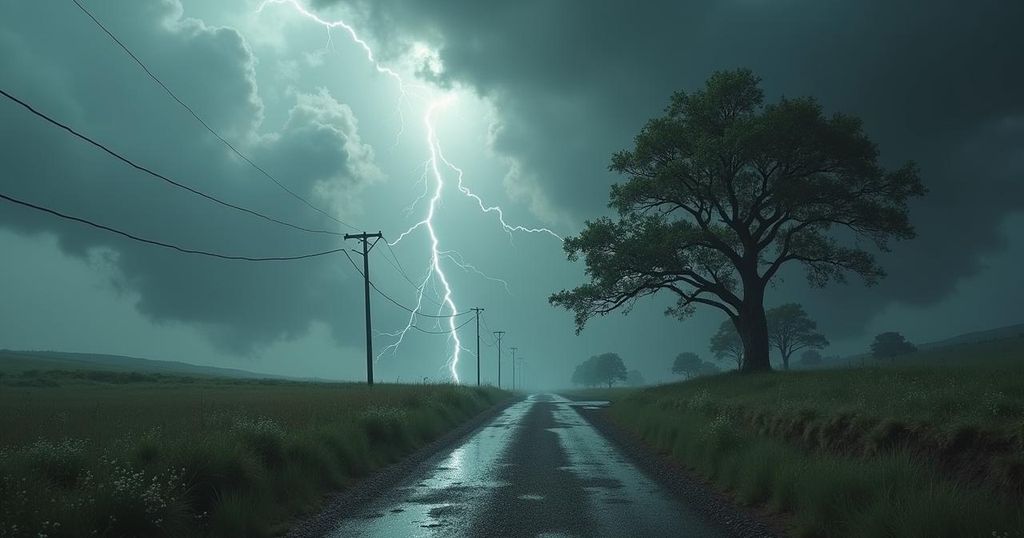The Impact of Climate Change on Hurricane Intensity: Lessons from Helene and Milton
Human-induced climate change has worsened hurricane impacts, increasing rainfall from Hurricane Helene by 10%, and wind speeds by 11%. Such conditions enhance the likelihood of future hurricanes like Milton. Continued fossil fuel burning poses ongoing risks of unprecedented flooding, particularly inland. Recent studies highlight the urgent need for improved disaster preparedness and a shift towards sustainable energy practices.
Recent research indicates that human-induced climate change has significantly exacerbated the impacts of Hurricane Helene, resulting in a 10% increase in rainfall and an 11% intensification of winds. This analysis, conducted by scientists from the World Weather Attribution group, highlights the profound influence of a warming climate, which propelled wind speeds by approximately 13 miles per hour and rendered the sea temperatures that energized the storm between 200 and 500 times more likely. Sea temperatures in the Gulf of Mexico were recorded at about 3.6 degrees Fahrenheit above average. Ben Clarke, co-author of the study and climate researcher at Imperial College London, emphasized that the elevated temperatures in the atmosphere allow for greater moisture retention, leading to significantly higher rainfall totals during such storms. The report cautions that similar enhancements are anticipated for Hurricane Milton, which is currently posing a threat to the Florida coast. The research further warns that continual fossil fuel consumption will result in an increased frequency of severe hurricanes akin to Helene, potentially leading to catastrophic flooding not only along coastlines but also inland. Notably, it was reported that many casualties attributed to Hurricane Helene resulted from significant inland flooding rather than from the hurricane’s wind strength. Hurricane Helene made landfall in Florida with record-breaking storm surges of 15 feet and sustained winds of 140 miles per hour, adversely affecting regions such as Georgia, the Carolinas, Tennessee, and Virginia, and resulting in extensive destruction and loss of life. Helene released an unprecedented rainfall total that meteorologists estimate exceeded 40 trillion gallons, a volume that would have been markedly less severe without human-induced climate change. The likelihood of hurricanes as intense as Helene has risen dramatically; previously expected once every 130 years, such storms are now approximately 2.5 times more probable in the affected regions. This report is a product of a rapid assessment initiated by the WWA in 2015 to quantify the connection between extreme weather events and climate change. It utilized various models and data to analyze the extent to which climate change influenced Helene’s intensity. Further research from the Department of Energy’s Lawrence Berkeley National Lab corroborates these findings, indicating that climate change enhanced rainfall by 50% in specific areas affected by Helene, with some regions experiencing rainfall that was made 20 times more probable due to global warming. Experts, including Kim Cobb, Director of the Institute at Brown for Environment and Society, acknowledge uncertainties in quantifying the precise effects of climate change on storm intensity. However, she firmly states that such phenomena should serve as a clarion call for improved emergency preparedness and resilience planning. The ongoing warming trend is anticipated to exacerbate hurricane statistics in the coming decades, leading to new records of intensity and destruction. The juxtaposition of Hurricanes Helene and Milton exemplifies the potential future trajectory of severe weather events in the context of climate change, demanding immediate action towards transitioning energy systems and reducing fossil fuel dependency to mitigate expected risks and costs associated with such disasters. As noted by Clarke, “As we go into the future, we still have control over what trajectory this goes in as to what risks we face in the future, what costs we pay in the future. That just hinges on how we change our energy systems and how many more fossil fuels we burn.”
This article addresses the increasing severity of hurricanes, particularly Hurricane Helene, as a direct consequence of climate change. It explores the latest scientific findings that attribute the intensity of such storms to human activities that lead to a warmer atmosphere and ocean, which in turn affects weather patterns and increases the likelihood of devastating weather events. The discussion surrounding Hurricane Milton, which is a subsequent threat, underscores the ongoing urgency of addressing climate change to prevent future disasters.
The findings from recent scientific assessments clearly delineate the role of climate change in intensifying hurricanes such as Helene and the impending risk posed by Milton. The research implores a comprehensive response to the climate crisis, emphasizing that without significant alterations to current energy practices and a reduction in fossil fuel consumption, the frequency and severity of extreme weather events will continue to escalate, leading to catastrophic humanitarian and environmental consequences.
Original Source: www.mychamplainvalley.com




Post Comment